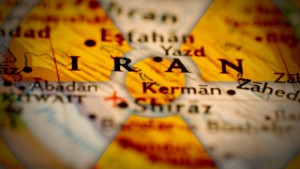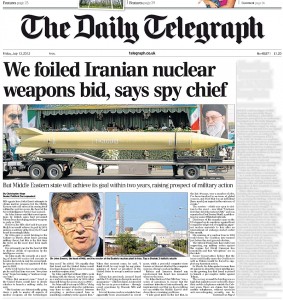Israeli Defence Minister Ehud Barak’s recent comments indicating that Israel has delayed its attack-Iran timeline by 8-10 months is causing a stir among Iran watchers. From the Daily Telegraph:
Earlier this year, however, Iran delayed the arrival of that moment. Tehran has amassed 189kg of uranium enriched to 20 per cent [...]]]>
 Israeli Defence Minister Ehud Barak’s recent comments indicating that Israel has delayed its attack-Iran timeline by 8-10 months is causing a stir among Iran watchers. From the Daily Telegraph:
Israeli Defence Minister Ehud Barak’s recent comments indicating that Israel has delayed its attack-Iran timeline by 8-10 months is causing a stir among Iran watchers. From the Daily Telegraph:
Earlier this year, however, Iran delayed the arrival of that moment. Tehran has amassed 189kg of uranium enriched to 20 per cent purity, a vital step towards weapons-grade material. In August, the country’s experts took 38 per cent of this stockpile and converted it into fuel rods for a civilian research reactor, thus putting off the moment when they would be able to make uranium of sufficient purity for a nuclear bomb.
Mr Barak said this decision “allows contemplating delaying the moment of truth by eight to 10 months”. As for why Iran had drawn back, the minister said: “There could be at least three explanations. One is the public discourse about a possible Israeli or American operation deterred them from trying to come closer. It could probably be a diplomatic gambit that they have launched in order to avoid this issue culminating before the American election, just to gain some time. It could be a way of telling the IAEA [International Atomic Energy Agency] ‘oh we comply with our commitments’.”
Mr Barak added: “Maybe it’s a combination of all these three elements. I cannot tell you for sure.”
The Arms Control Association has been pointing out the importance of Iran’s use of the 20% enriched material for TRR fuel plates ever since the August IAEA report.
But US-Iran relations expert Trita Parsi argues that Israel hasn’t backed down. In fact, Prime Minister Bibi Netanyahu has gotten everything he’s campaigned for so far:
]]>The choreography around Israel’s threats to attack—unless the U.S. and the EU further sanctioned Iran, did not strike a deal, and committed to take military action at some point—was elaborate, relentless and quite convincing. A never-ending stream of dramatic verbiage created the impression that this time around is different from the many threats Israel issued in the past. Israel cries wolf over and over again, yet escapes being held to account thanks to the fear in the West that Israel might just be serious this time around.
But whether the bizarre, open debate in Israel recently about bombing Iran—with cabinet ministers airing their opinions and former intelligence officers publicly attacking Netanyahu for his “messianic” tendencies—has been deliberate or accidental, Netanyahu and his team have been bluffing, not threatening.
The front page of the 13 July edition of the Daily Telegraph caused a stir in Britain. The headline, amplified by that morning’s BBC News, read: “We foiled Iranian nuclear weapons bid, says spy chief”. Referencing a speech by the Chief of Britain’s Secret Intelligence Service (SIS) to [...]]]>
 The front page of the 13 July edition of the Daily Telegraph caused a stir in Britain. The headline, amplified by that morning’s BBC News, read: “We foiled Iranian nuclear weapons bid, says spy chief”. Referencing a speech by the Chief of Britain’s Secret Intelligence Service (SIS) to 100 civil servants, the article begins with these two sentences:
The front page of the 13 July edition of the Daily Telegraph caused a stir in Britain. The headline, amplified by that morning’s BBC News, read: “We foiled Iranian nuclear weapons bid, says spy chief”. Referencing a speech by the Chief of Britain’s Secret Intelligence Service (SIS) to 100 civil servants, the article begins with these two sentences:
Sir John Sawers said that covert operations by British spies had prevented the Iranians from developing nuclear weapons as early as 2008.
However, the MI6 chief said it was now likely they would achieve their goal by 2014, making a military strike from the US and Israel increasingly likely.
Later in the day The Guardian’s Julian Borger reported on his blog that Whitehall (British government) sources were saying that the point Sawers was trying to make was that without the combined work of Western intelligence agencies, Iran would have been even closer to obtaining the capacity to make a nuclear weapon.
That seems to be a likelier account, not least because it’s consistent with what the US intelligence community has been saying since 2007. (Over the years I’ve noticed a SIS weakness for exaggeration when it comes to trumpeting their achievements, despite their attachment to secrecy “in the national interest” when blunders have to be veiled).
So, it’s striking that Borger’s piece was not followed by an official clarification of what Sawers had said or meant. Instead, millions of Telegraph readers and BBC listeners who do not read Borger’s blog have been left with the impression that Iran is intent on acquiring nuclear weapons and will do so by 2014.
To my mind this failure is symptomatic of a Western reluctance to acknowledge that the balance of probability has shifted since 2003: the evidence suggests that Iran switched that year from the goal of possessing nuclear weapons to the goal of possessing a “threshold” capacity – and to adjust policy accordingly.
Yet, legally there is a significant distinction between seeking weapons and seeking a threshold capacity: one is outlawed by the Nuclear Non-Proliferation Treaty (NPT), the other is not.
As far back as 1968, US State Department officials were aware that under the freshly-minted NPT it would not be unlawful for a non-nuclear-weapon-state to achieve what they termed “nuclear pregnancy”. (Since 1968 several such states have done just that. If Iran acquires and is allowed to retain a nuclear weapons capacity, it will be in good company.)
It can even be argued that seeking “nuclear pregnancy” is for certain states a logical corollary to being an NPT party. Those who are familiar with the NPT will know that it includes a provision for withdrawal in the event that “extraordinary events, related to the subject matter of this Treaty, have jeopardised the supreme interests” of a party.
Nuclear-weapon-state lawyers have doubtless strained to interpret this splendid example of diplomatic obscurantism in ways that favour the possessor states. The natural meaning, though, is that if a party feels that its security is threatened by a state possessing nuclear weapons, it may withdraw from the treaty.
It can be inferred that the drafters of the NPT could envisage without blanching that certain states might want to acquire a latent capacity to produce weapons quickly in certain extreme circumstances; they recognised that withdrawal would serve no useful purpose to a threatened party if that party had to embark from scratch on weapons research and the production of fissile material.
Morally, practically, politically and psychologically, too, the weapons/capacity distinction is important.
There is no double standard involved in objecting to Iran becoming nuclear-armed; refusing to tolerate an Iranian “pregnancy” is a double standard.
A nuclear-armed state may reasonably be thought to present a “clear and present danger” to other states (though in practice the reality of the threat is usually questionable), whereas a threshold state cannot.
None of Iran’s more respectable friends — it has more of these than Western propaganda admits — want Iran to get nuclear weapons. But they are philosophical about Iran attaining threshold status.
Iran’s leaders know that crossing the line separating capacity from possession would be fraught with consequence. As Frederick the Great once observed, one can get away with one breach of faith (in this case Iran’s NPT safeguards violations prior to 2004) but not two.
Yet Western leaders have failed to take a consistent stand on the high ground offered by this distinction.
One reason for this may be that our leaders believe that tolerating an Iranian weapons capacity — and acknowledging tacitly that “nuclear pregnancy” is not unlawful — could trigger proliferation. The same Telegraph reporter claims that earlier this year Sawers warned Ministers about a potential threat to Britain from a nuclear arms race in the Middle East. I shall address this possibility in a future piece.
]]>